Barroso's Last Autumn?
Adelina Marini, September 3, 2013
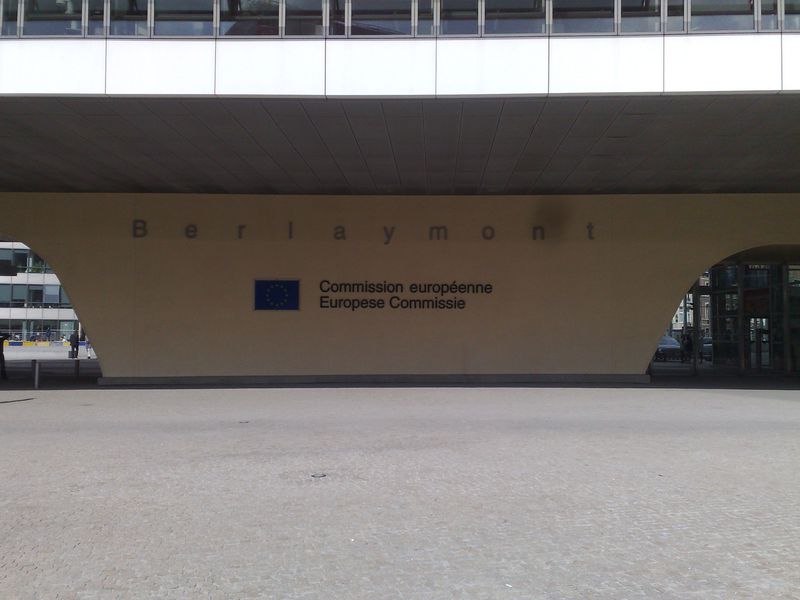 A very dramatic European political season is looming up, marking the beginning of, may be, the first in EU's history common European pre-election campaign or, at least, these are the ambitions. In the end of May there will be not simply elections for MEPs that will take place almost simultaneously in all member states, but furious battles for the position of the European Commission president. A post which is essential for keeping the course toward European integration. According to the Lisbon Treaty, which entered into force on December 1st, 2009, the European political families will be able to nominate candidates of their own for Jose Manuel Barroso's chair, which creates pre-conditions the topic to reach voters and for the first time, may be, to remove entirely the domestic issues that usually accompany the elections for the European Parliament.
A very dramatic European political season is looming up, marking the beginning of, may be, the first in EU's history common European pre-election campaign or, at least, these are the ambitions. In the end of May there will be not simply elections for MEPs that will take place almost simultaneously in all member states, but furious battles for the position of the European Commission president. A post which is essential for keeping the course toward European integration. According to the Lisbon Treaty, which entered into force on December 1st, 2009, the European political families will be able to nominate candidates of their own for Jose Manuel Barroso's chair, which creates pre-conditions the topic to reach voters and for the first time, may be, to remove entirely the domestic issues that usually accompany the elections for the European Parliament.
As early as a year before the elections, scheduled to take place between May 22-25 2014, speculations started about potential candidates. So far, several names have been circulating of many strong personalities and politicians. For the position of a European Commission chief ambitions has the Luxembourg veteran in the Commission Vice President Viviane Reding, who is a third term EU commissioner. Currently, she is responsible for a key area - justice, fundamental rights and citizenship - because of which she is loved by the citizens of some of the newer member states who rely on Brussels to force their uncontrolled political elites to stick to European norms. In this sense, the Bulgarians would certainly support her. But she will hardly receive the approval of the Bulgarian government in the European Council if it remained in power because of the support Ms Reding quite publicly pledged to the protesters against oligarchy in the country during the civil dialogue with her in Sofia in July.
Even without this reason, Ms Reding would have hardly received Plamen Oresharski's support 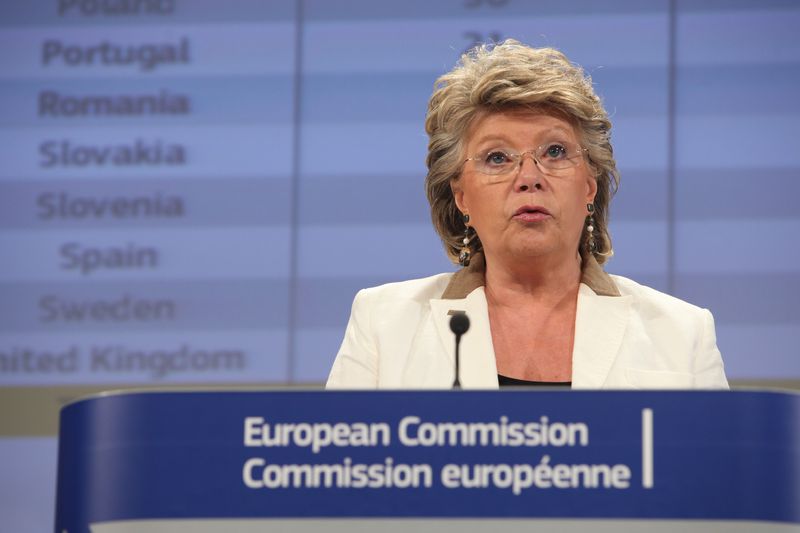 because he leads a centre left coalition while the former journalist, Reding, is a member of the Christian Social People's Party which is part of the family of the European People's Party.
because he leads a centre left coalition while the former journalist, Reding, is a member of the Christian Social People's Party which is part of the family of the European People's Party.
Reding is unlikely to be accepted by another left-wing government, but not only because it is left, rather because of the problems it created - the government of Croatia's Prime Minster Zoran Milanovic. His first conflict ever since his country has become a member of the EU on July 1st, 2013, was precisely with Viviane Reding because of the passed literally in the 11th hour amendments to the law on police and judicial cooperation thus imposing a restriction the European arrest warrants to be implemented in Croatia only for crimes committed after 2002. A conflict with which Mr Milanovic had set a firm collision course, but it seems that for now he is becoming reconciled. But he will hardly forget this when the moment comes the selected nomination to receive the approval of the member states.
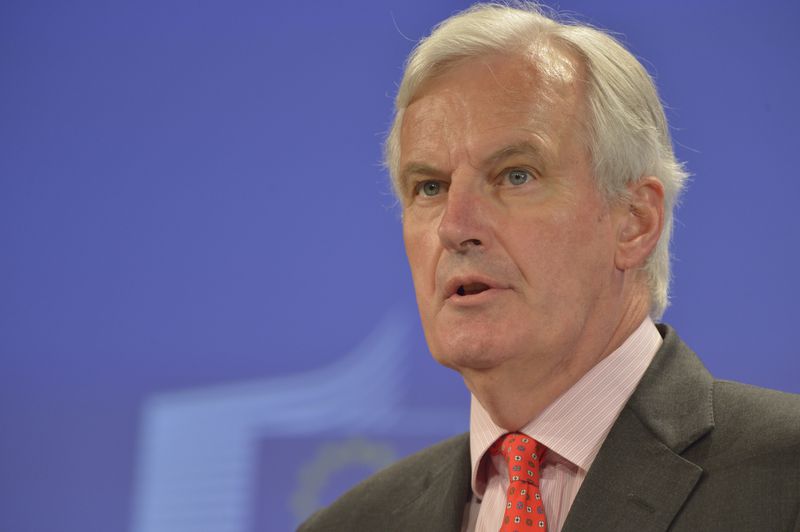 In the right-wing corridors also circulates the name of Internal Market Commissioner Michel Barnier. Mr Barnier has a long French career, sitting in many ministerial chairs, including he was a minster of foreign affairs, of European issues and also of agriculture. He is a second term EU commissioner, but his area of competence has given him some significant advantages. He is not of the most charismatic europoliticians because he is quite constrained and not very media active. This could prove his biggest advantage because such a behaviour, the lack of serious conflicts with individual member states and also his good cooperation at the international stage while he was pushing for the reform of the financial system in coordination with the G20 countries, could bring him success. His second advantage is that he is French, although the Commission had so far had twice a president from France, but due to the lack of a strict rule it is no problem because of the political environment at the moment and the not very harmonious partnership between Paris and Berlin, a third French commissioner to prove a good exchange coin.
In the right-wing corridors also circulates the name of Internal Market Commissioner Michel Barnier. Mr Barnier has a long French career, sitting in many ministerial chairs, including he was a minster of foreign affairs, of European issues and also of agriculture. He is a second term EU commissioner, but his area of competence has given him some significant advantages. He is not of the most charismatic europoliticians because he is quite constrained and not very media active. This could prove his biggest advantage because such a behaviour, the lack of serious conflicts with individual member states and also his good cooperation at the international stage while he was pushing for the reform of the financial system in coordination with the G20 countries, could bring him success. His second advantage is that he is French, although the Commission had so far had twice a president from France, but due to the lack of a strict rule it is no problem because of the political environment at the moment and the not very harmonious partnership between Paris and Berlin, a third French commissioner to prove a good exchange coin.
Another very strong name that is being mentioned in the corridors in Brussels and Strasbourg is that of European Parliament chief Martin Schulz - a German Socialist. Mr Schulz is a very ambitious and hardline politician who has managed to squeeze out the maximum powers the Lisbon Treaty provides to the European Parliament and to turn it into a key institution in European politics. Something which was not quite of the liking of Chancellor Angela Merkel of Germany who is on her path to win a third term in office at the elections in Germany in end-September. Given Mr Schulz's successes in his capacity as a Europarliament chief Ms Merkel will hardly desire such a strong figure to sit against her in Brussels, especially from her home country. Mr Schulz has been defending steadily, purposefully and straightforwardly the deepening of European integration and is unyielding in terms of the European Parliament's role.
He caused several huge collisions at European level one of which was on the key negotiations over the multiannual budget of the Union for the period 2014-2020. Strasbourg opposed the member states and succeeded to drain out all the possible concessions - a territory that had before that been entirely occupied by the member states, the negotiations on which were led for decades along the axis London-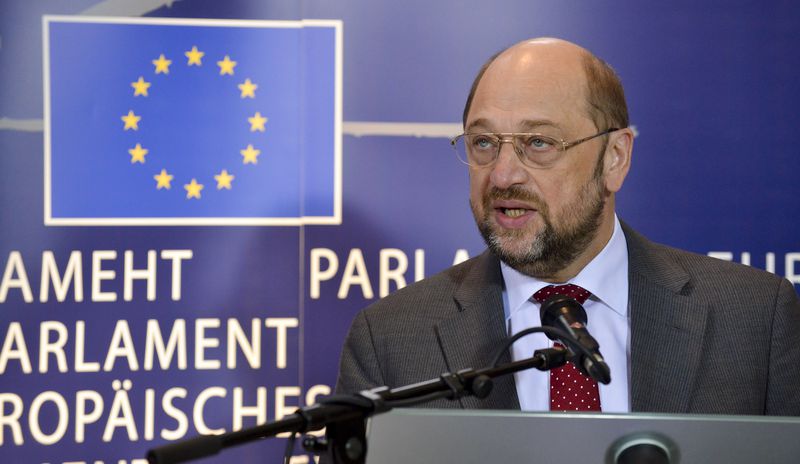 Paris-Berlin. But now, the European Parliament took a strategic position, thanks to the Lisbon Treaty, that raised it to a co-legislative body on this so important and long-term issue. Martin Schulz also declared war to the Council on another important dossier - the reform of Schengen.
Paris-Berlin. But now, the European Parliament took a strategic position, thanks to the Lisbon Treaty, that raised it to a co-legislative body on this so important and long-term issue. Martin Schulz also declared war to the Council on another important dossier - the reform of Schengen.
The Council, in general, but individual heads of state or government, too, often took severe blows from Strasbourg regarding the eurozone debt crisis, as the most frequent and sharp attacks were coming mostly with regard to solving Greece's problems. Moreover, again because of the new powers the Lisbon Treaty granted, but also because of the accountability established with the reform of the economic governance of the EU, the Europarliament, embodied in Mr Schulz, turned into an institution before which the member states' leaders are held accountable to the European voters, not only the national onces. Before MEPs in Strasbourg and Brussels appeared literally for cross interrogations the leaders of France, Germany, Austria, Finland, Slovenia and more are to come. And the economic committee of the Europarliament has turned into a real financial committee which seeks explanations from the member states' finance minsters.
And all this is not only a merit of Mr Schulz, but he brought flesh into the skin which the new European legislation tailored for the EU. A skin that seems to be too tight for the German Socialist. May be, this is precisely what will be as his biggest advantage so his biggest flaw when the moment comes to be decided who should sit in Barroso's chair.
Another very strong nomination is that of Guy Verhofstadt, the former prime minster of Belgium who leads the parliamentary group of the Liberals in EP. This is one of the most vociferous, eloquent and sometimes conflict speakers in Strasbourg. He is also the most outspoken eurofederalist for whom there is no other solution to the European problems but federalisation. He often comes up with own initiatives, proposes ideas, writes articles and, to sum up, he is an active political figure in European politics. His chances, however, are slim because the Liberals are a third political force in the current composition of the Europarliament and for now there are no big reasons to believe that this could 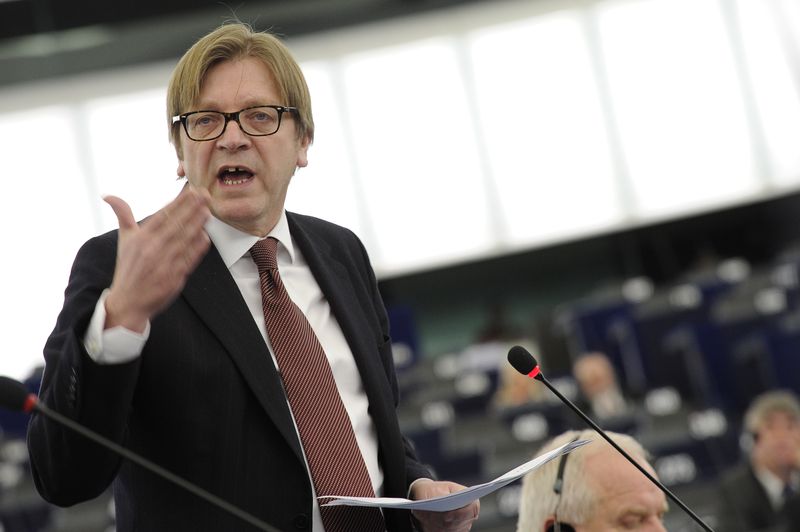 change for the better. On the contrary. With the rise of nationalistic speech the populist parties like that of the most vociferous eurosceptic Nigel Farage - UK Independence Party - are expected to gain much more seats.
change for the better. On the contrary. With the rise of nationalistic speech the populist parties like that of the most vociferous eurosceptic Nigel Farage - UK Independence Party - are expected to gain much more seats.
So, Verhofstadt's nomination will depend on the support of other parties which is too early to talk about. His ambitions, however, can be hugely threatened not from the outside, but from the inside. Recently, information appeared in Finnish media that a key figure in Jose Manuel Barroso's Commission is warming up for the post European Commission chief - EU Commissioner Olli Rehn. He is also a veteran in European politics and has very strong reputation which dates back to his work as an enlargement commissioner in the Barroso's first commission from 2004 to 2009. Mr Rehn "nursed" the accession to the EU of Bulgaria and Romania. His second position, though, as a chief of the economic and financial sector in the Commission, has made him a key figure in Brussels, mainly thanks to the economic and financial crisis.
Mr Rehn has turned into Mr Barroso's right hand, introducing steadily and relentlessly the austerity policy. As part of the European Commission chief's attempts to enhance the Commission role and to counteract the inter-institutional approach which Germany had undertaken Olli Rehn was promoted to first vice president with enhanced powers, while his area of competence was afterwards enlarged to include the eurozone economic and financial issues. A post which Barroso was preparing in case the German idea of a European finance ministry was realised. For now this idea is dropped, but Olli Rehn's power remained. In spite of the several heavy blows he sustained because of the work of the troika, mostly in Greece, Rehn succeeded to maintain self-possession and it can even be said that his efforts at this stage are rewarded.
After the relations between EU and IMF deteriorated sharply because of the Fund's admission that mistakes were made in the analyses of the Greek situation and after the revelation of the error of the economists Kenneth Rogoff and Carmen Reinhart, whose studies are in the foundation of the austerity policy for debt reduction and economic growth stimulation, Olli Rehn and his policy seemed to have failed. Up to the moment when Eurostat published the data for the second quarter, showing for the first time an exit from the recession, especially for countries for which scoring positive growth was not expected that early.
And although Greece is expected to again hit the headlines this autumn, Olli Rehn has significant support from the Eurostat data and the European Central Bank. The Alliance of Liberals and Democrats for Europe will have a very difficult task to choose who to nominate for the post - the vociferous Guy Verhofstadt or the moderate and exacting Olli Rehn. The choice will depend to a large extent on nationality, too. The fact that Mr Verhofstadt is a Belgian does not work to his advantage. Belgium currently is in serious economic woes. It is among the countries with huge debt and a lot of work to clear the piled economic imbalances. Though it is politically stable at present, this is not for granted. Unlike Belgium, Finland increased significantly its influence in European politics, the merit for which is fiscal discipline and the country's economic successes after the crisis in the beginning of the 1990s of last century.
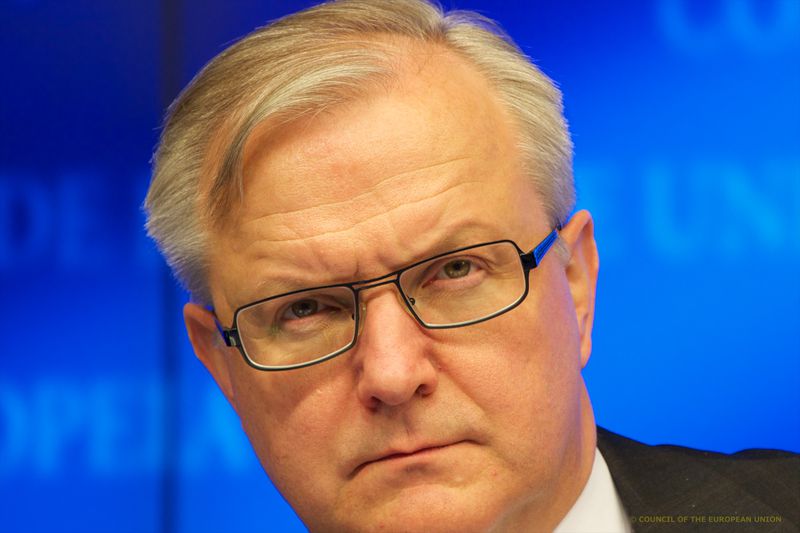 Finland has positioned itself among the leading European powers in the past years, imposing its opinion on issues like the multiannual budget, economic governance, the assistance for Greece, the enlargement of Schengen for Bulgaria and Romania. Olli Rehn's nomination is very strong and acceptable for the Nordic forces in Europe, but it will hardly be acceptable for the southern periphery which suffered badly from the belt-tightening policy. At this stage, it is not clear to what extent Mr Rehn will receive the support of Jyrki Katainen's government, who leads a bipolar left-right coalition which Rehn's party - Centre - is not part of. Rehn could be a good candidate in case the right parties again position themselves as the biggest group in the European Parliament, but this, currently, is hard to forecast. Moreover, the right forces in some countries are licking severe wounds sustained after electoral defeats.
Finland has positioned itself among the leading European powers in the past years, imposing its opinion on issues like the multiannual budget, economic governance, the assistance for Greece, the enlargement of Schengen for Bulgaria and Romania. Olli Rehn's nomination is very strong and acceptable for the Nordic forces in Europe, but it will hardly be acceptable for the southern periphery which suffered badly from the belt-tightening policy. At this stage, it is not clear to what extent Mr Rehn will receive the support of Jyrki Katainen's government, who leads a bipolar left-right coalition which Rehn's party - Centre - is not part of. Rehn could be a good candidate in case the right parties again position themselves as the biggest group in the European Parliament, but this, currently, is hard to forecast. Moreover, the right forces in some countries are licking severe wounds sustained after electoral defeats.
In the end of the day, the choice of the appropriate candidate will depend mainly on the seats the big political families will gain. This pushes the elections into a vicious circle because it will have to be strategically decided in what direction should they go - a battle for seats or a battle for a candidate. If the former direction is chosen, then it is very likely national politics to dominate and the European Commission chief post to remain a consequence. But if the latter option is selected, then it is possible the European elections to turn into, indeed, common European voting. This, though, will legitimise the European Commission as the second institution with, practically, directly elected chief after the Europarliament, which could deepen the conflict which Charles Grant, director of the UK pro-European think-tank Centre for European Reform, wrote about.
On the selection of approach it will depend whether the trend of a constantly dropping voter turnout at the European elections will be ended. This turnout depends also on party leadership. It is possible the currently biggest party - EPP - to get a new leader after the 77-year old Wilfried Martens was hospitalised. Apart from party leadership, though minimal, impact will have the actions of the political families. EPP stained its image because of their uncritical support for their own governments for whom there were clear signs they violated European values. This was most evident in Hungary and Bulgaria.
The second largest Party of European Socialists also harmed itself after uncritically standing behind their leader - former Bulgarian premier Sergey Stanishev, whose party is currently taking part in a government coalition considered by thousands of Bulgarian citizens as representing the interests of the oligarchy. The protests against Plamen Oresharski's government will soon complete three months, but the cabinet shows no intention of resigning, nor to undertake reforms in key for Bulgaria and its European image areas. PES also supported its government in Romania which was involved in a severe inter-institutional war with the president and violated fundamental principles of the rule of law. As a result, the European Commission came up with an extraordinary report under the Control and Verification Mechanism in the beginning of the year. As a matter of fact, the Commission, whose president is from the EPP, did not subject to such a strong pressure the government of Boyko Borissov for similar violations, which is a symptom of the Commission's politicisation which Charles Grant talks about in his analysis.
Europe is currently at crossroads and has to decide what path to follow. This choice is essential, especially against the backdrop of the new global challenges - the inflamed neighbourhood, the strained relations with Russia, the trade battles with China, the transatlantic relations. That is why the European elections next year will be a clear sign for the future - more EU or more opt-outs from the common rules.
 Federica Mogherini | © Council of the EU
Federica Mogherini | © Council of the EU | © Council of the EU
| © Council of the EU Luis De Guindos | © Council of the EU
Luis De Guindos | © Council of the EU